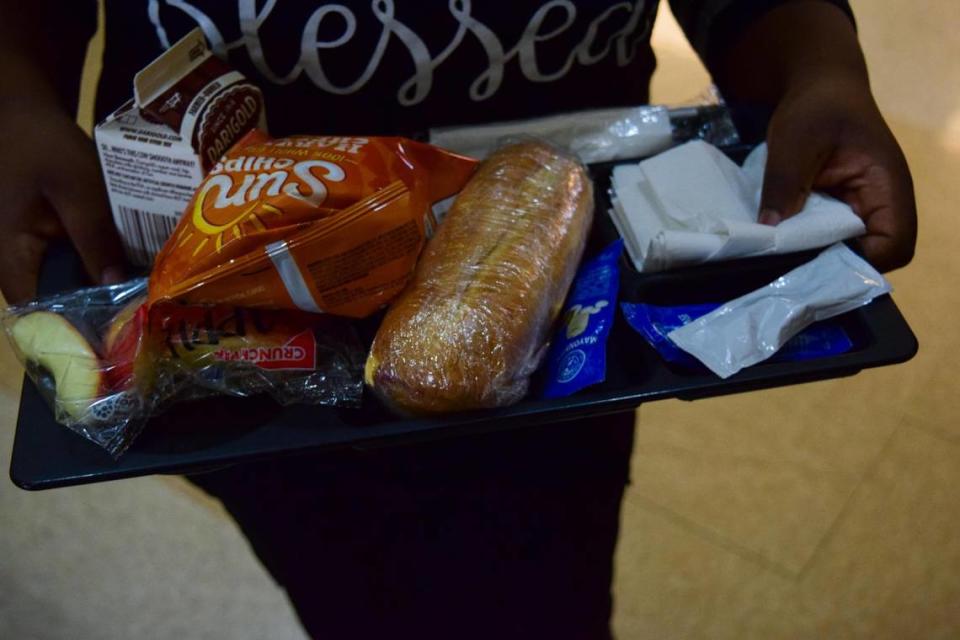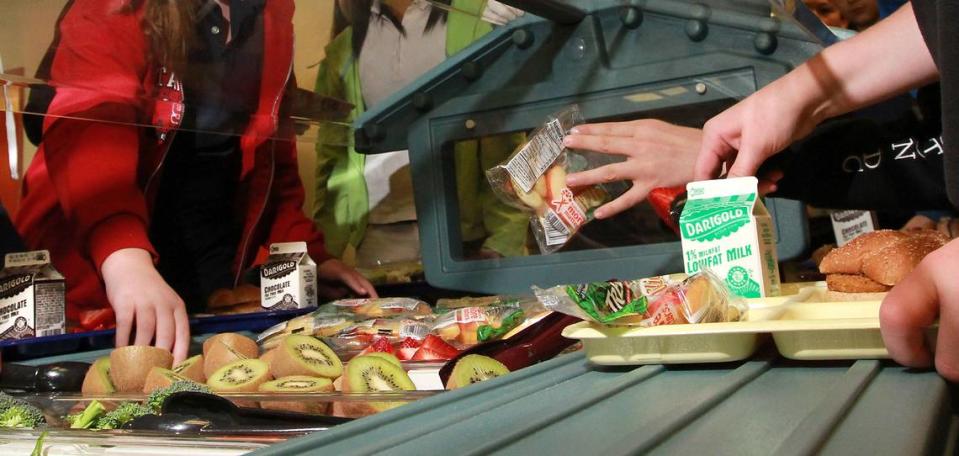There’s a national milk carton shortage. Here’s what WA state school districts are doing
Milk is an integral part of school lunches. If you’re building a tray in a school cafeteria, especially before high school, chances are, your drink options are varieties of milk.
In Washington state, schools generally have one of three kinds of milk supplies: cartons, pouches or dispensers.
The milk pouches grew in popularity during the 90s and 2000s. School districts across the country opted for the pouches over cartons to save money and reduce waste. Since then, reports have varied regarding popularity dips.
In recent years, some schools have implemented milk dispensers to cut out even more waste. Instead of half-pint plastic bags for each individual student, these schools stock up on large pouches of milk, between three and five gallons, which is then placed inside the dispenser. It has multiple spouts, so students can take reusable cups to pour the amount of milk they want.
Despite these innovations, there are still a large number of schools and districts, nationwide and in the state, using the classic cardboard cartons. These schools have been informed of a national milk carton shortage and the possible impacts it may have. Here is what we know about the shortage.

Milk carton shortage impact on WA
Recently, the Washington Office of the Superintendent of Public Instruction (OSPI) sent a statement to school districts about the national milk carton shortage. Because the shortage affects only milk cartons, not the milk itself, some schools will be unaffected.
The severity the shortage will have on Washington state is not currently clear. But these districts using cartons are preparing for possible impacts.
▪ Tacoma
Tacoma Public Schools is facing the shortage in milk cartons, but has a contingency plan in place to provide students with the milk that is available as well as alternatives to milk cartons, Tacoma Public Schools Chief Communications Officer Tanisha Jumper said in an email.
Jumper stated in the email that OSPI has approved that Tacoma Public Schools “take advantage of ‘7 CFR 210.10(d)(2)(i)’ waiver allowing juice as an alternative until allowable milk types become available.”
Jumper added that all students in the Tacoma Public Schools will have access to the milk variety that is available daily and they will also have the option of having juice as an alternative if needed.
Tacoma Public Schools will also be providing all Child and Adult Care Food Program (CACFP) and Head Start staff with gallons of milk to pour for all Pre-K students with their family style meal service.
▪ Thurston County
The Olympia School District has several milk dispensers in place at specific schools, but also has several schools without dispensers. For those schools, a contingency plan has been put in place, in the event the shortage impacts the district, according to Conor Schober, the district’s Community Relations Coordinator.
The district has also informed parents of the contingency plan. The letter to parents reports the Olympia School District milk provider is expecting availability to change each day. There may be days with limited supply or milk alternatives instead.
If half pints are not available during a school meal, students can ask kitchen staff to receive a poured cup of milk, according to Schober.
The North Thurston Public Schools have not seen a shortage in milk carton orders, but they have a plan in place in case they are affected, North Thurston Public Schools Executive Director of Communications Amy Blondin said in an email.
Blondin said that if the North Thurston Public Schools were to be affected by the shortage, they will prioritize their elementary schools for any half pints of milk available.
“We have let our school leaders know they may be seeing different brands, flavors, and fat contents, and if milk is not available, we will apply for waivers and offer juice and water,” Blondin said.
They have also ordered shelf-stable milk to have on-hand in case there is a shortage.
▪ Bellingham
Bellingham Public Schools has also notified families about the shortage. In the most recent update, it says the district will have fresh milk through the week of Nov. 13 and is working closely with their supplier. It also says it is looking for other adequate options in case they are necessary.
Students have always had access to water during meals, but are now also encouraged to bring refillable water bottles or ask for a cup. This way, they remain adequately hydrated throughout any impacts of the shortage.

▪ Tri-Cities
The Richland School District’s Public Information Officer Shawna Dinh told McClatchy that the district’s latest Darigold shipment was received in full. They are coordinating with OSPI and their distributors to keep an eye on future impacts.
The Kennewick School District informed parents that the shortage is expected to impact the district as early as the week after Veterans Day. According to Robyn Chastain, the district’s executive director of communications, KSD has received a temporary waiver to serve juice and water options with student meals.
Pasco School District is also aware of the impacts and coordinating with OSPI, according to the Director of Nutrition Services, Kristen Blair. The district’s Public Affairs Director, Anna Tensmeyer, told McClatchy that they are working with their distributor through the situation and will act accordingly as it continues. This week, only white milk was offered, instead of the usual choice between white and chocolate.

